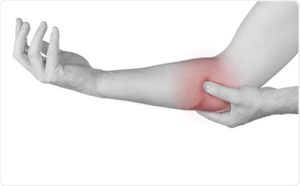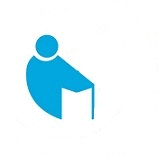
Lateral epicondylitis, commonly known as tennis elbow, is a painful condition involving the tendons that attach to the bone on the outside (lateral) part of the elbow. Tendons anchor the muscle to bone. The muscle involved in this condition, the extensor carpi radialis brevis, helps to extend and stabilize the wrist. With lateral epicondylitis, there is degeneration of the tendon’s attachment, weakening the anchor site and placing greater stress on the area. This can then lead to pain associated with activities in which this muscle is active, such as lifting, gripping, and/or grasping. Sports such as tennis are commonly associated with this, but the problem can occur with many different types of activities, athletic and otherwise.
CAUSES
Overuse – The cause can be both non-work and work related. An activity that places stress on the tendon attachments, through stress on the extensor muscle-tendon unit, increases the strain on the tendon. These stresses can be from holding too large a racquet grip or from “repetitive” gripping and grasping activities, i.e. meat-cutting, plumbing, painting, weaving, etc.
Trauma – A direct blow to the elbow may result in swelling of the tendon that can lead to degeneration. A sudden extreme action, force, or activity could also injure the tendon.
Who gets tennis elbow/lateral epicondylitis?
The most common age group that this condition affects is between 30 to 50 years old, but it may occur in younger and older age groups, and in both men and women.
SIGNS AND SYMPTOMS
Pain is the primary reason for patients to seek medical evaluation. The pain is located over the outside aspect of the elbow, over the bone region known as the lateral epicondyle. This area becomes tender to touch. Pain is also produced by any activity which places stress on the tendon, such as gripping or lifting. With activity, the pain usually starts at the elbow and may travel down the forearm to the hand. Occasionally, any motion of the elbow can be painful.
TREATMENT
Conservative (non-surgical)
At Alimran Medical Center, we may recommend any of the following treatments:
Chiropractic
Steroid injection
- Trigger point injections
- Epidural steroid injections
- Transforaminal injections
Ozone injection
Prolotherapy
